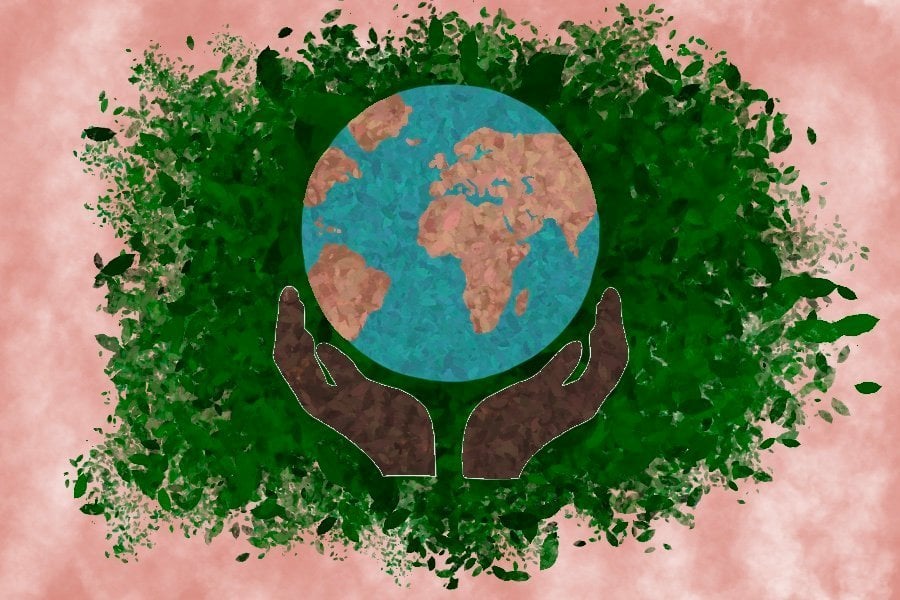Feminist in Residence Je-Shawna Wholley brings Black family archiving to Northwestern’s Women’s Center
Daily file illustration by Catherine Buchaniec
As the “Feminist in Residence” at Northwestern, Je-Shawna Wholley launched her “Earthseed” Black family archiving project that walked participants through a nine-month series of workshops and dialogues.
July 19, 2022
Je-Shawna Wholley sits on her patio on the South Side of Chicago, where she’s lived for the last three years. Her potted herb garden is lush with oregano, rosemary and lemon balm, which sway as the light breeze blows. Her fingers work meticulously, arranging pink and lavender flowers in bouquets.
By making peace with family histories, Wholley hopes to heal.
This year, as the Women’s Center’s Feminist in Residence, Wholley brought her Earthseed Black Family archiving project to Northwestern. Earthseed stems from Afro-futurist writer Octavia Butler’s “Parable of the Sower.” The main character has a series of visions, called the “Earthseed Verses,” on how to move through a world that’s breaking down politically, socially and emotionally.
“I started to shift my focus (to) — okay, how do we prepare for conflict?” Wholley said. “How do we start archiving our stories? How do we deepen our relationships so that we can be a resource for each other as we are preparing for the breakdown of society as we know it.”
Central to this project is the family unit — both biological and chosen — and recalling the Second Wave feminist phrase, “the personal is political.”
“We focus on the Black family as a site of liberation and resistance,” Wholley said. “Because if we can strengthen the circles that we are part of, we are strengthening the ways that we show up in public and the ways that we can show up for the world.”
Wholley defines home as her mom, her sister and her grandmother’s house. And more recently, it has expanded to include her chosen family and Chicago, a new place where she’s trying to build a life with her partner.
Wholley’s Earthseed cohort is composed of thirteen participants across multiple generations and time zones meeting monthly online for family archiving workshops. Wholley worked alongside participants through the activities, including genome mapping, ancestral meditation and talking with therapists about intergenerational trauma
Yolande Jackson, a Florida-based artist and creative writer who explores Black family histories and a member of the cohort, first heard about the Earthseed program from her friends. She said she wanted to create an exhibit combining the sayings of her mother and her more immediate family, while also reclaiming and reimagining the histories of her ancestors who lived in Africa.
“What came out of this for many of us,” Jackson said, “was just a lot of self discovery and a lot of healing in spaces that we didn’t know we needed to be healed.”
For Jackson, this self discovery and healing included learning more about her great grandmother, who she previously hated because of a singular experience when she was younger. But, having conversations with her mother about her great grandmother opened up her view and mended the relationship.
Jakalia Brown, another cohort participant and a data manager working in Atlanta, said the Earthseed experience allowed her to work through the “elephant in the room” in her family’s history — her maternal grandmother’s father murdered his wife.
“It was important for me to be vulnerable enough in this process to name that,” Brown said. “If we just let the elephant sit there, it’s only going to start to suffocate us and take up more and more space.”
The process wasn’t easy. But while Brown said she used to lament the family she grew up in, she now believes the family she was born into and the experiences she had were “arming (her) for something” — to slow down, listen to her ancestors, learn their stories and share them with others.
For Wholley, healing the family and learning from your ancestors constitutes the first step to building a better world that heals and empowers historically marginalized populations.
“It’s an afro-futurist tenant,” Wholley said, “to be able to take what we understand, look at where we came from, and go beyond our imagination for what’s possible.”
Email: [email protected]
Twitter: @yimingfuu
Related Stories:
— Tracing buried roots: African American genealogy group works to recover forgotten histories
— Author speaks on diversity and inclusion as part of Women’s Center series


